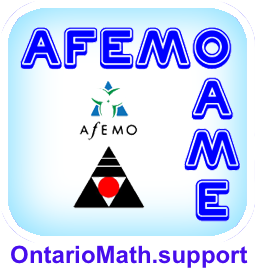President's Message - March 2015
Running Into a Pole
PAUL ALVES
paul.alves@oame.on.ca
When we first encounter Daniel, he is leading one of the documentarians on a hike through a trail in southern California. This seems completely unremarkable, except for the fact that Daniel is blind. He leads the hike and finds his way along the trail through the use of echolocation. Echolocation uses the echoes that are perceived by the ear from an emitted call, much like bats find their way in the night. Daniel uses clicks that he creates by using his tongue and the top of his mouth. He makes his way along the trail with ease, skirting the edge of cliffs, using a walking stick, and all the while, clicking to perceive what is around him. Daniel has gained some media notoriety for his skill, especially since he uses it to ride a bike.
The story then returns to Daniel's childhood and how he acquired the skill. Of particular interest was his mother's reaction when he lost his sight at the age of five. Daniel's mother relates how she faced a decision: What should she do now that her child was blind? How would she respond as a parent? In short, what she decided was to simply open the door and let him be a five-year-old boy. As he explored his environment, by necessity and almost by instinct, he started clicking. Once he realized that clicking provided him with the ability to make his way around his world, he did the same things that all five-year-olds do: climb a tree, run in his yard, and one day, ride a bike. He had a particular favourite game of starting from the top of his road and barrelling down full speed on his bike. One day, he didn't react quickly enough and ran into a pole. The bike and Daniel were a mess, but like any kid, he got up and, once his mother picked up a new bike, he started riding again.
This is where the quotation came in and resonated with me as I related it to teaching. Sometimes, as a teacher, the problems I provide don't allow for the productive struggle, and sometimes failure, that leads to the learning. This would be that zone of proximal growth. My expectations of my students influence my instructional decisions and in turn affects student learning.
Eventually Daniel reached a point in his life where he wanted to share his skill. In the podcast, we listen in as a young boy is being taught by his blind teacher to click and explore his environment at a field near his home. His caregiver watched on as the young boy learned to trust what his ears were perceiving around him. Along one side of the field runs a busy road, and I listened with anxiety as the child approached the road and clicked to find his way. Finally, when the boy was just a few feet from the road, his caregiver reached out and pulled him back. What the boy's teacher says at this point goes to the heart of what I still struggle with in my own classroom. By reaching out and pulling the child back, the young boy's teacher gently lets the caregiver know that we have removed the learning opportunity for the student. We can't blame the caregiver for reaching out and guiding the child to safety. In the same way, when we are in the classroom and jump in when we see a student struggle, we do this from a desire to see the child succeed. But in much the same way, we have removed the opportunity to learn. Now there is a difference between allowing our children or our students to struggle with a problem and protecting them from physical harm. But the parallel drawn here is between the skill that the young boy was trying to acquire to become independent of his caregiver and how we want our students to become critical thinkers and lifelong learners. The struggle and sometimes mistakes along the way are important parts of that process of learning.
This idea of allowing students to struggle is an important stage in the learning process and forms a key part of what is called the "growth mindset." The growth mindset was introduced by Stanford professor Dr. Carol Dweck and laid out in her book Mindset: The New Psychology of Success. The podcast actually includes a brief interview with Dr. Dweck as she discusses the impact of expectations. The growth mindset has been a significant theme of some of the professional development that OAME has organized and delivered for teachers this school year. The Leadership Conference in November featured Dr. Jo Boaler, a leading advocate for teaching math with a growth mindset. The conference was a high point for me this year. Perhaps you were there or followed what was happening on Twitter. The demand to attend was overwhelming and we had to close registration. Amy Lin kicked off the Leadership Conference by sharing her Tales of Passion, and the conference was concluded on the Saturday, with Dr. Cathy Bruce and Shelley Yearley speaking on the visible and invisible work of math leaders.
If you didn't get a chance to make it out to the Leadership Conference, but want to participate in highquality professional development and learn more about what teachers are doing around mindset, the provincial conference is around the corner, and mindset forms the backdrop for many of the sessions in the program. The theme for the conference is Building Mathematical Mindsets. The conference is being held at Humber College and will be a great opportunity to hear speakers, but to also share as a community. If you are unable to attend in person, don't forget about the opportunity to attend through the eConference. You can get more information by going to www.oame2015.ca.
I hope that you will get an opportunity to make it out to the conference, but if you can't, why not download the podcast and start a dialogue with your colleagues about the value of struggle in the learning process? Again, the struggle may be a drag, but it isn't a disaster.
Previous Message:
Holiday Time For Mathematics
Next Message:
What A Year!


















 Like us on FaceBook
Like us on FaceBook